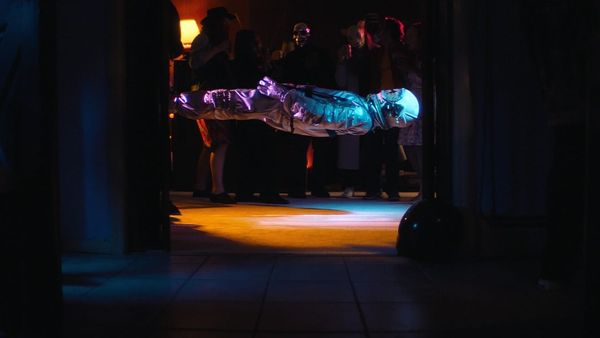Eye For Film >> Movies >> Linoleum (2022) Film Review
Linoleum
Reviewed by: Jennie Kermode

There’s a dreamlike logic to Colin West’s second feature (after the promising but not-quite-there Double Walker) which invites viewers to step back from the puzzle with which they are presented and absorb other forms of meaning. In light of this, its slighty too obvious central conceit becomes not a challenge, not another twee twist, but a framework through which to explore ideas about personal identity and the search for meaning, as well as delivering gentle comedy. There’s a warmth underlying it all which doubtless contributed to the affection with which it was received on the festival circuit.
The story focuses on the character of Cameron (Jim Gaffigan), the fiftysomething presenter of a once popular educational science programme now shifted to the midnight slot. The familiar routine of his life is disrupted when, as he is cycling home one day, he is narrowly missed by a red sports car when falls out of the sky. Making the situation stranger is the fact that the severely injured driver looks like him – as does new neighbour Kent (also Jim Gaffigan), who also drives a red sports car and just happens to be taking over his television role, much to his dismay.

This might easily be enough to precipitate a mid-life crisis by itself, but just a short time later, Cameron’s life gets another shake-up when a piece of space junk falls from the sky and lands in his back garden. Forbidden to enter their home by stern-faced government scientists, he and his family are swiftly relocated, but he can’t resist sneaking back to take a look at the wreckage. He has always wanted to go into space, and when Kent’s son Marc (who also happens to be romancing his lesbian daughter, Nora) also takes an interest in it, a plan develops: to use pieces of what remains to build a brand new spacecraft in the garage.
All this adds a lot of drama to what is, at its heart, a character piece. West has assembled a terrific cast. Gaffigan makes a charming lead and is almost unrecognisably different as Kent, presenting them as two men who have gone down very different roads in life. Rhea Seehorn, much loved by Better Call Saul fans, makes Cameron’s wife and former co-presenter, Erin, a force to be reckoned with. There’s a deep connection between the two characters which seems unbreakable despite the fact that they’re discussing divorce. Meanwhile, Katelyn Nacon (as Nora) shows an impressive command of the type of comedy which most actors take decades to age into. She and Gabriel Rush (who plays Marc) may look a little too old for their roles, but that sits neatly in a filmic tradition which complements the small town American setting.
Nothing here is quite what it seems. When we see the young people in the context of their high school, there’s an interesting reversal of familiar dynamics: Nora is really quite horrible to popular girl Darcy (West Duchovny), who we never see do anything mean to her. The motive for this behaviour is inscrutable and there’s a suggestion that Nora doesn’t really understand in either. Marc is facing a different kind of bullying, at home, and the complex relationship between them reflects the way that both are struggling to establish their own identities.
All of this takes place in a timeless world with a carefully controlled colour palette which touches on classic Americana. Editor Keara Burton repeatedly lets shots run on slightly too long, a technique which is initially unsettling and gradually eases the viewer into a rhythm which sets the film apart from other works of its kind, adding to its contemplative quality. By the time that West is ready to show his hand directly, most viewers will be so wrapped up in Linoleum that that details will scarcely matter. In a care home, Cameron’s elderly father shows him a Möbius strip. “It has only one side,” he explains, and you’ll know which side you’re on.
Reviewed on: 16 Apr 2023
















